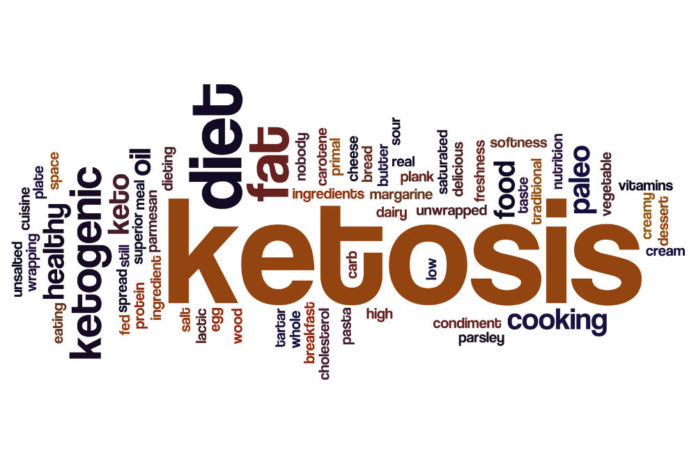Welcome back to part 3 of our basic series explaining what ketosis is and how it can be beneficial.
In parts 1 & 2, we reviewed what ketones are, how our body makes them, and how they are used as a fuel source. Today, we will talk about the $10,000 Question: Why would a person want to be in ketosis? This answer is multifactorial, as people have used nutritional ketosis for a myriad of different reasons. Most people dip their toes into the “Keto Diet” because they want to lose weight. However, there are numerous other reasons people adapt to a ketogenic lifestyle. Some use it to help mitigate various symptoms of inflammation such as arthritis or acne. Some people use it for an advantage in sports performance, namely endurance sports like marathons, cycling, triathlons, etc. Some people use it to help their mental clarity and mood. And some folks find better sex drive and fertility (Note: I’ve been working on a post for resources and scientific studies about these very topics. Feel free to keep an eye out as the list continues to grow).
As I stated in part one, a ketogenic diet (aka “keto”) is a low carbohydrate diet. However, it differs from other popular low carb diets like Atkins (www.atkins.com) and Protein Power (www.proteinpower.com). Where those are indeed lower carb compared to the Standard American Diet (SAD), they may not be low enough in carbohydrates to induce ketosis. The 1st phase of Atkins is very low carb (under 20 net grams) to promote ketosis, however in the actual Atkins guidelines this phase is only meant to be done for 2 weeks. This differs from a truly ketogenic diet, as this carb restriction is meant to last indefinitely (unless utilizing a modified keto diet like the cyclical or targeted ketogenic diets, which we’ll explain later).
When carbohydrates are reduced enough (sometimes 5% or less of calories consumed) and more natural fat is consumed in its stead, your body enters the metabolic state of ketosis. This state causes your body to become more efficient at using fat as a fuel source (instead of just constantly storing it). Also, the liver coverts fats into ketones (as we explained in Part 2) that can act as an alternative source of energy for the brain (1,2). Ketogenic diets have shown to help lower and improve blood sugar and insulin levels. Also, the increased levels of ketones have shown to have other health benefits as well. (1,3,4,5)
Side Note: If you want to geek out on science and metabolism of ketones/ketosis, I’m going to recommend you check out Dr. Peter Attia’s blog over at The Eating Academy. He does a deep dive that I think science enthusiasts will really appreciate. These two articles are of significant value:
http://eatingacademy.com/nutrition/ketosis-advantaged-or-misunderstood-state-part-i
http://eatingacademy.com/nutrition/ketosis-advantaged-or-misunderstood-state-part-ii
The studies cited above (and more that I haven’t linked to) have shown to be an effective strategy for losing weight and reducing disease risk. Also, there are numerous studies showing that the ketogenic diet out performs low-fat diets (6, 7, 8, 9). In fact, a ketogenic diet has shown that it’s possible to lose weight without cumbersome calorie counting or food journaling as shown in a study published by the American Journal of Clinical Nutrition (http://ajcn.nutrition.org/) in 2008 (8). A 2007 study published in Diabetic Medicine (the journal of the British Diabetic Association; http://onlinelibrary.wiley.com/journal/10.1111/(ISSN)1464-5491) showed that those on a low carb, ketogenic diet lost 3 times more weight than those on the Diabetes UK’s recommended diet. That is pretty darn substantial!
Yet another study showing significant results is a 2003 study published in The Journal of Clinical Endocrinology & Metabolism (http://press.endocrine.org/journal/jcem) (11). This study showed that participants lost 2.2 times more weight and 2.4 times more body fat than those on the calorie restricted, low-fat diet. This study also had another interesting finding, as stated in the discussion section:
” Another unexplained, but important, observation was the spontaneous restriction of food intake in the very low carbohydrate diet group to a level equal to that of the control subjects who were following a prescribed restriction of calories. This raises the possibility that the very low carbohydrate diet may have been more satiating”
In a nutshell, what this observer is saying is that the participants did not feel the need to eat regular full meals, possibly even refusing to finish what was in front of them, because they didn’t feel the need to continue eating; they were full. And what they did end up eating during the day counted up to about the same number of calories as the others who were restricting their calorie intake.
Ok, its effectiveness in losing weight has been covered. But HOW do you DO the keto diet? A buddy of mine and fellow ketonian, Larry Lustig, summed it up well in one sentence: “Replace the carbohydrates you eat with fat.” https://www.ketogenicforums.com/t/the-entire-ketogenic-diet-in-one-sentence/497
The following is going to be MY recommendation based on what I’ve learned from studying the topic, as well as my personal experience. Other Keto proponents might disagree with what I say, and that’s perfectly fine.
It’s important to remember that each person is different, so these ratios of fat:protein:carbs needs to be individualized. The breakdown of a typical keto diet is about 70-75% calories from fat, 20-25% from protein, and 5-10% from carbohydrates. It can be beneficial to count calories and track your food when you first start, as there can be hidden carbs and sugars in foods that you wouldn’t expect (sugar in cured meats for example). I for one HATE counting calories, so now that I’ve been doing this long enough, I have a good grasp on the macros of the foods I generally eat. I don’t count calories or journal; I just go by hunger levels and how I feel.
Note that it can take an average of 21 days to become keto adapted!!! Some folks take less time, some can take more. And it can take a few days to a week of strict carb restriction before you start turning those pee sticks (Ketostix) colors. These are used to monitor ketosis when you first start out. When you do start going into ketosis, you are going to lose retained water and with that you will lose sodium. It’s important to make sure you are getting enough salt.
Example meal plan when I was eating 3 times a day:
Breakfast: 3 eggs, 2 slices of bacon, 1/2 of an avocado
Lunch: BAS (Big Ass Salad) with bleu or feta cheese, whatever full cut meat I wanted (usually what I had for leftovers, just diced up. Do NOT go for lean meats. You need the fat.), and a high-quality dressing, like something from Newman’s Own or my new favorite by Primal Kitchen (http://www.primalkitchen.com/shop/)
Dinner: Grilled Pork Steak and Green Beans or Broccoli cooked in Butter
Now that I’m keto/fat-adapted, my hunger is blunted, so I usually only eat lunch (my new Break-Fast) and dinner. I might have a Keto drink (a shake or coffee with exogenous ketone supplement, another subject for another day) in the morning, but often I’m just not hungry.
Common mistakes I see (and have learned from experience):
Not enough salt: When going from fat-burning after being a sugar-burner for so long, you will lose water and sodium. Some people report a feeling of brain fog and fatigue. Often this is because they are low on salt. Feel free to add salt to your meals, and consider a cup of bullion or bone broth once every 1-2 days.
Too much protein in relation to your amount of activity and/or level of insulin resistance: This is more likely for highly insulin-resistant folks like myself. Excess protein cannot be stored, and will be broken down to glucose via gluconeogenesis. This rise in glucose can kick you out of ketosis. You might not have that problem with your training, but it’s something I had to learn the hard way. Please note that, IN MY OPINION, excess protein is only a problem if you are SEVERELY insulin resistant (like yours truly). If you have less than 50 lbs to lose, of if you’re doing a lot of strength or muscle work like bodybuilding, strongman training, or Crossfit, this is unlikely to be the case. This area of study is still in its infancy, and there seems to be a lot of disagreement in the LCHF camp. My $0.02: If you are not morbidly obese and you live a semi-active lifestyle, you’re probably not going to be consuming too much protein. If you are very insulin resistant and are sedentary, you can skip the 20 oz steaks and protein shakes.
Too many carbs: Carb levels are so individualized that it’s almost moot to talk about. Some folks can stay in ketosis around 100 grams of carbs a day. Some folks do better on 50 grams. I, myself, because of my insulin resistance, must stick between 20-30 or fewer grams. A general guideline is the more weight you need lose, the lower your carb count needs to be. I’m a rip-the-band-aid-off kind of guy, so I’m all about just dropping down to 20 grams, get adapted, and then play with number of carbs based on YOUR situation.
Side Note: In the low carb community, a constant debate is how to count carbs. Some people count Net carbs (Total carbs – fiber- sugar alcohols = net). This is what Dr. Atkins recommended in his protocols. However, I am in the count total carbs camp. If you look at some of these “low carb” treats and protein bars, you might see a bar have 23 grams of total carbs, but, after subtracting fiber and sugar alcohols, it might only have a net carb count of 6. I’ve had trouble with this for a couple reasons. First, this type of leniency can lead to overindulgence of these foods. Second, sugar alcohols can still raise the blood sugar of some people and kick them out of ketosis, lead to cravings, or both (which was my personal experience as well).
“I feel kinda crappy for the first few days, so it must not be good for me”: What a ridiculous excuse. Personal note: I used to smoke, and it sucked quitting. I was irritable, I’d get headaches, blah blah blah. Doesn’t mean it was BAD for me, my body was just in transition. Same thing here. When you are changing the fuel that your body utilizes (fat burner vs sugar burner), it’s going to take an adaptation process (we talked about how your body needs to get better at creating beta-hydroxybutyrate dehydrogenase in Part 2).
So what CAN you eat? Check this list out for a good breakdown of Low Carb Approved Foods
http://www.ketogenic-diet-resource.com/low-carb-food-list.html
Basically it comes down to plenty of meat (don’t shy away from the fatty cuts), and green leafy or non-starchy vegetables. Also remember that you want to keep your net carbs (total carbs minus fiber) under 20 grams starting out. And if you’re more insulin resistant (like yours truly), you may need to keep TOTAL carbs under 20 grams.
So there you have it: Why a person can benefit from nutritional ketosis and how to do it. That was a long post, thanks for hanging in there with me. I hope that it brought you a lot of value. In my next post, I will be discussing the effect of ketosis on special situations such a diabetes, cancer, Alzheimer’s disease, heart disease, polycystic ovary syndrome (PCOS), and more. Also, I’ll be working on a book review for Gary Taubes’s new book, The Case Against Sugar. Stay tuned!
1: https://www.ncbi.nlm.nih.gov/pubmed/14525681
2:https://www.ncbi.nlm.nih.gov/pubmed/6865776
3: https://www.ncbi.nlm.nih.gov/pubmed/14769489
4: https://www.ncbi.nlm.nih.gov/pubmed/11122785
5:https://www.ncbi.nlm.nih.gov/pubmed/14769483
6: https://www.ncbi.nlm.nih.gov/pubmed/23632752
7: https://www.ncbi.nlm.nih.gov/pmc/articles/PMC2633336/
8: https://www.ncbi.nlm.nih.gov/pubmed/18175736 (This one shows can lose without Counting Calories or food journaling)
9: https://www.ncbi.nlm.nih.gov/pubmed/15466943
10: https://www.ncbi.nlm.nih.gov/pubmed/17971178 (lost 3x more weight than Diabetes UK’s recommeneded diet)
11: https://www.ncbi.nlm.nih.gov/pubmed/12679447 (showed keto lost 2.2 times more weight than CR, Low fat; along with improved Tri and HDL levels)



